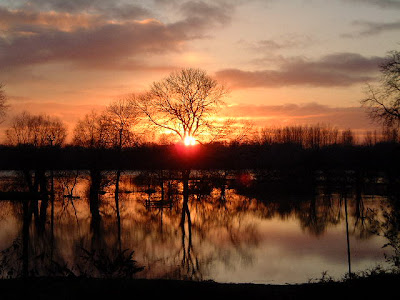From bats and balls to boats and birding

A flooded landscape at sunset: pretty to look at but not welcomed by farmers and some unfortunate householders
It's well known that change is something which many Budleigh residents are unwilling to accept, but when the forces of Nature are involved it's unlikely that a conservative approach will win any battles.
That seems to be the point made recently by East Devon's largest landowning business faced with the issue of flooding from the River Otter. Understandably it's a message that Budleigh Salterton Cricket Club, idyllically located on low-lying land at the river's mouth, is not especially keen to hear.
In fact the issue is something which, as a relative newcomer to Budleigh, I'd hardly dared to mention on this site. Almost as tricky as the long-contested plans for development of the Longboat Café, which I've passed over in cowardly silence.

That seems to be the point made recently by East Devon's largest landowning business faced with the issue of flooding from the River Otter. Understandably it's a message that Budleigh Salterton Cricket Club, idyllically located on low-lying land at the river's mouth, is not especially keen to hear.
In fact the issue is something which, as a relative newcomer to Budleigh, I'd hardly dared to mention on this site. Almost as tricky as the long-contested plans for development of the Longboat Café, which I've passed over in cowardly silence.

Budleigh Salterton Cricket Club: one of the lowest-lying cricket grounds in England
But I see that the message from Clinton Devon Estates is likely to be relayed with increasing volume as the cricket field floods yet again. Last month's BBC local news item at http://www.bbc.co.uk/news/uk-england-devon-11231580 struck me as rather gloomy as it mentioned "a managed retreat from some land" by the Estate because of "future rising water levels" caused by possible climate change. It rather sounded as if the whole of the Lower Otter Valley would be abandoned to a kind of waterworld as not only cricket pitches but sewage works, footpaths and farmland would be submerged.
The BBC had obviously been struck by CDE Estates Manager John Varley's words earlier in the year describing the history of the Lower River Otter as "a battle between man and water that has lasted for generations." During his speech on 24 April 2010 at the President's Symposium of the Devonshire Association, now published on CDE's website at http://www.clintondevon.com/content/news/contested-landscapes-embracing-your-externalities.ashx Mr Varley had explained how what he called "a contested landscape" was turning into "a war zone." Since 1959, 21 floods had affected property and roads in the Lower Otter Valley and in 2009 the Estate had decided that "the time had come for a new phase of the battle to begin."
Haycock Associates, a company that specialises in preventing and dealing with the aftermath of flooding by creating natural solutions, had been invited to study the problem of the River Otter. The company, which had been called in by the National Trust following the dramatic Boscastle flood of 2004, had concluded that there was insufficient drainage and that the tidal effect exacerbated the problem.
The subject of flooding had been touched on by Mr Varley a few weeks earlier in a talk outlining how Clinton Devon Estates saw the Lower Otter Valley's future over the next 30 years. "Protecting the status quo is not the answer," we were told at the Open Meeting on 17 March organised by Budleigh Salterton Town Council. Climate change had to be accepted and there was a need to be readier to accept genetically modified crops as well as reviving the tradition of farm ponds to deal with water shortages. Eucalyptus, he said, looks like becoming an interesting crop for the Estates.
But it's the damaging consequences of flooding of low-lying land which seem to be the Estates' principal preoccupation. Bunds and drainage ditches to protect the area are one of the possible options if the Cricket Club is to stay in its current location. Alternatively, say the experts, a relocation to higher ground for the Club linked to the formation of a freshwater lake would be a viable solution, providing a resource for water dependent crops but also deep enough to support recreational pursuits like sailing http://www.clintondevon.com/_assets/PDF/SKMBT_C35110071310270.pdf
The BBC had obviously been struck by CDE Estates Manager John Varley's words earlier in the year describing the history of the Lower River Otter as "a battle between man and water that has lasted for generations." During his speech on 24 April 2010 at the President's Symposium of the Devonshire Association, now published on CDE's website at http://www.clintondevon.com/content/news/contested-landscapes-embracing-your-externalities.ashx Mr Varley had explained how what he called "a contested landscape" was turning into "a war zone." Since 1959, 21 floods had affected property and roads in the Lower Otter Valley and in 2009 the Estate had decided that "the time had come for a new phase of the battle to begin."
Haycock Associates, a company that specialises in preventing and dealing with the aftermath of flooding by creating natural solutions, had been invited to study the problem of the River Otter. The company, which had been called in by the National Trust following the dramatic Boscastle flood of 2004, had concluded that there was insufficient drainage and that the tidal effect exacerbated the problem.
The subject of flooding had been touched on by Mr Varley a few weeks earlier in a talk outlining how Clinton Devon Estates saw the Lower Otter Valley's future over the next 30 years. "Protecting the status quo is not the answer," we were told at the Open Meeting on 17 March organised by Budleigh Salterton Town Council. Climate change had to be accepted and there was a need to be readier to accept genetically modified crops as well as reviving the tradition of farm ponds to deal with water shortages. Eucalyptus, he said, looks like becoming an interesting crop for the Estates.
But it's the damaging consequences of flooding of low-lying land which seem to be the Estates' principal preoccupation. Bunds and drainage ditches to protect the area are one of the possible options if the Cricket Club is to stay in its current location. Alternatively, say the experts, a relocation to higher ground for the Club linked to the formation of a freshwater lake would be a viable solution, providing a resource for water dependent crops but also deep enough to support recreational pursuits like sailing http://www.clintondevon.com/_assets/PDF/SKMBT_C35110071310270.pdf

An aerial view of Brewster, Massachusetts, showing some of the freshwater ponds which play an important role in the area's natural resources
A change of landscape? Certainly, but one that would continue to be a haven for birdwatchers. And that mention of freshwater ponds makes me wonder whether the Lower Otter Valley will in due course look a little bit like the Cape Cod landscape surrounding our sister-town of Brewster, shown above.



Comments
Post a Comment